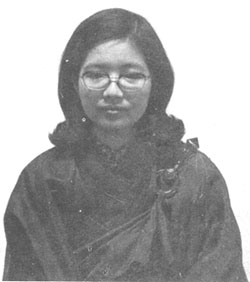|
"It won't be easy," replied the Master.
"I'm
ready for it." said Shan-chih. Then she asked, "How shall
I prepare for it?"
"You can start by learning to eat only one meal
a day," the Master told her.
Actually Shan-chih had read many articles in
various Buddhist Publications which told how the cultivators at Gold Mountain
eat only one meal a day and never lie down to sleep. She had wanted to leave home for
a long time and had visited many temples and monasteries in Taiwan. She had
decided that when she left home she wanted to do so in a place where the people
really cultivated, and it was for this reason that she asked the Master for
permission to come to Gold Mountain. She also wanted to learn how to translate
Buddhist texts and knew that she could study that there as well.
"Most
of all," she said, "I want to find a place where people are devoted
to actually practicing Buddhism. I'm not vigorous, and I know that unless I find
vigorous people to follow, I will soon have a downfall and retreat in my
cultivation. After talking with the Master I began to practice taking only two
meals a day, eliminating the evening meal, so that by the time I arrived at Gold
Mountain it was not so difficult for me to eat only once a day."
During the summer of 1974 Shan-chih's father passed away, and she
realized that it was now possible for her to fulfill her desire to leave the
home life. With this goal in mind, she came to Gold Mountain in the early autumn
and on November 17, 1975, took refuge with the Triple Jewel, received the five
precepts, and bowed to the Venerable Abbot as her teacher. Her Dharma name is
Kuo-ching "Fruit of Quiet."
The members of the Gold Mountain
community were very happy to welcome her. In the short period of her residence
at the International Institute for the Translation of Buddhist Texts, she has
already become an invaluable member of the Buddhist Text Translation
Society
The end
-From
the Venerable Master Hua's lectures on the Avatamsaka Sutra.
Let's look at the causes and effects of the past, present, and future. It
is said:
If
you want to know the causes from lives past
Look
at what you're undergoing now.
If
you want to know the effects in lives to come
Look
at what you're doing now.
If
in former lives you planted a seed, this life you reap that fruit. If you plant a good cause you reap a good result. If you
plant an evil cause you reap an evil result. If you plant neither
good nor evil causes, you reap neither good nor evil results.
If you want to know what's going
to happen in the future you should look at what you are doing now. If you do
good things now, in the future you will reap good fruit. If you do evil things
now, in the future you will reap evil retribution. You yourself make cause and
effect; it's not made for you by Buddha’s and Bodhisattvas. Yet other
religions say that such and such a God rules over all. This is a grave error.
It's like walking: when you want to go east you turn east, and when you want to
go west, you turn west. It's up to you. Cause and effect are also like that.
|
